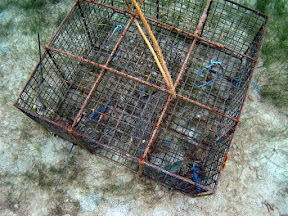Overfishing
Overfishing

The use of exploitive and destructive fishing practices on coral reefs is a globally extensive problem with a long history. Indeed, species extinction due to overfishing dates earlier than that by all other factors, including pollution, water quality degradation, and climate change. [1] Despite its reputation as an early, destructive anthropogenic influence on coral reefs, overfishing is still a growing problem. The global fishing effort has steadily increased since 1970[2] with no signs of abatement in the near future.
History
A variety of evidence exists for determining historical fishing pressure on coral reefs. This evidence includes paleological sedimentary records, archeological records from human coastal settlements, written historical documents, and ecological records from scientific literature. Using these sources, three periods of fishery exploitation have been identified: aboriginal or subsistence exploitation, characterized by simple technologies and a limited geographic extent, colonial or systematic exploitation, characterized by merchantile powers utilizing distant resources, and more recently, geographically pervasive global exploitation. [1] This article focuses on the latter period.
Causes
The exploitation of coral reef fisheries is largely due to increased demand on the global market for reef fish (Cinner and McClanahan, 2006). The issue of overfishing is therefore difficult to mitigate, because it is tied to global economic and population growth and increasing demand on a global scale. Since it is driven by global economic growth, it would require at least 20-50 years to change the trend of overfishing, even if strong effort to stop the issue began immediately. Even as fish populations are being depleted and global catch declines, fishing pressure continues to increase (Bradbury, 2012). Based on catch data and estimates for increasing rates of fishing pressure, it is estimated that if overfishing continues without intervention, the world's fisheries will have collapsed by 2048.
The recent use of technology in fishing practices has also accelerated the rate at which fish are removed from reefs. Modern fishing instruments such as sonar and GPS make it much easier for fishermen to locate and catch huge schools of fish. The use of huge, industrial fishing vessels, with the capacity to access a larger area and hold great amounts of fish onboard, has also increased the rate at which fish are removed from the environment.
fix citations throughout;
Effects
Overfishing of reef environments has significant impacts on ecosystem function. The removal of top predators leads to explosions in the populations of lower level consumers. These consumers then overgraze on coralline algae and cause coral abundance to decrease ((Stephens, 2012). Eventually, as more slow growing corals are removed, fast-growing seaweeds can overtake the environment, replacing coral (Smith 2010). However, a stable population of herbivorous fish is necessary for healthy ecosystem function and overfishing of herbivorous fish can also have profound ecosystem effects. Sufficiently dense populations of grazing fish and sea urchins abate harmful algae growth (Smith 2010).
Heavy fishing and harmful fishing techniques also have the capacity to do great damage to reef structures. The use of explosives or chemicals as well as some netting and trapping techniques damage coral substrate. Dynamite fishing and cyanide fishing are predominantly used in reefs in Southeast Asia. It is estimated that 56% of reefs in Southeast Asia are at risk as a result of these destructive fishing practices. The damage done to the coral substrate and the habitats of coral fish and creatures also continues to make them more vulnerable to stresses such as overfishing or destructive fishing (Jackson et al. 2001).
Management
Generally, coral reefs exhibit an inverted biomass pyramid, made possible by the external recruitment of a number of larval fish species. In the past, management efforts have predominantly focused on bottom-up processes, including the importance of herbivorous fish populations on abating harmful algae growth. However, increased fishing pressure has altered trophic level interactions,[3] necessitating the additional consideration of top-down processes when developing management strategies and practices. Some even advocate for management practices that have goals other than maximizing predatory and herbivorous fish stocks, focusing instead on higher cover of settlement-inducing crustose coralline algae to maintain the ecological and structural integrity of reefs.[4] However, the most widely recommended policies are those that advocate for management with multiple goals on an ecosystem scale to predict and avoid possible cascading effects.[1][5] In contrast, small-scale management practices are often made difficult and ineffective by the large-scale connectivity inherent in coral reef ecosystems, necessitating an increase in the scale of management, and specifically a network of interdependent reserves to maintain biodiversity.[6]
References
- ↑ 1.0 1.1 1.2 Jackson, J.B.C., Kirby, M.X., Berger, W.H., Bjorndal, K.A., Botsford, L.W., Bourque, B.J., Bradbury, R.H., Cooke, R., Erlandson, J.,Estes, J.A., Hughes, T.P., Kidwell, S., Lange, C.B., Lenihan, H.S., Pandolfi, J.M., Peterson, C.H., Steneck, R.S., Tegner, M.J., and Warner, R.R. 2001. Historical overfishing and the recent collapse of coastal ecosystems. Science 293(5530): 629-638.
- ↑ Anticamara, J.A., Watson, B., Gelchu, A., and Pauly, D. 2011. Global fishing effort (1950–2010): Trends, gaps, and implications. Fisheries Research 107(1-3): 131-136.
- ↑ Valentine, J.F, and Heck, K.L. 2005. Perspective review of the impacts of overfishing on coral reef food web linkages. Coral Reefs 24(2): 209-213
- ↑ Cite error: Invalid
<ref>tag; no text was provided for refs namedO’Leary et al. 2012 - ↑ Cite error: Invalid
<ref>tag; no text was provided for refs namedScheffer et al. 2005 - ↑ Roberts, C.M. 1997. Connectivity and management of Caribbean coral reefs. Science 278(5342): 1454-1457.